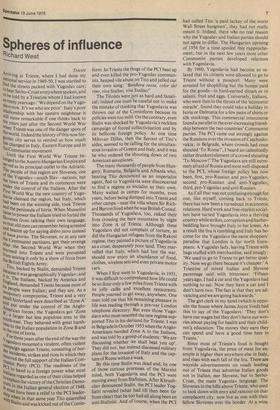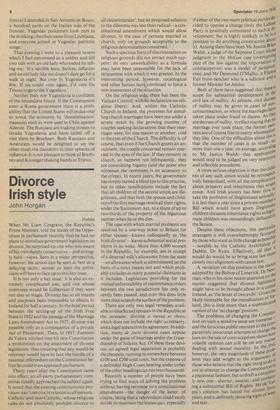Spheres of influence
Richard West Trieste Arriving at Trieste, where 1 had done my national service in 1949-50, I was startled to find the streets packed with Yugoslav cars; to hear Serbo-Croat everywhere spoken, and to be told by a Triestine whom I had known so many years ago: 'We depend on the Yugoslays now. It's we who are poor'. Italy's poor relationship with her eastern neighbour is Still more remarkable if one thinks back to the Years just after the Second World War When Trieste was one of the danger spots of the world. Indeed the history of this now forgotten city serves to remind us how much !las changed in Italy, Eastern Europe and in dte Communist movement. Until the First World War Trieste belonged to the Austro-Hungarian Empire and The as its principal outlet to the Adriatic. he People of this region are Slovenes, one Of the Yugoslav—south Slav—nations, but the town of Trieste and its commerce were nder the control of the Italians. After the ;irst World War the new country of Yugoslavia claimed the region, but Italy, which had been on the winning side, took Trieste and the peninsula of Istria. When Mussolini came to power the Italians tried to forbid the Slovenes from talking their own language, so that old men can remember being arrested and beaten up for saying dobrojutro instead buon giorno. The Slovenes, or at any rate the Communist partisans, got their revenge after the Second World War when they Stormed into Trieste and were prevented ,t,:°In seizing it only by a show of force from 'Ile B. ritish Eighth Army. 2Ito, backed by Stalin, demanded Trieste i7ause it Was geographically Yugoslav; and The Italians, backed by America and -tnitland, demanded Trieste because most of t: People were Italian; and they are. As a s InPorary compromise, Trieste and a very :Ilan hinterland were described as 'Zone A, Aild Put under the control of the AngloWnerican forces; the Yugoslays got 'Zone s: a larger but less populous area to the utah-east. They behaved with great harshness to the Italian population in Zone B and
rest of Istria.
or three years after the end of the war the e,llgoslavs mounted a virulent, often violent d'elnpaign against Trieste, consisting of borr,r !noidents, strikes and riots in which they 471v. ed the full support of the Italian ComItU,Inst Party (PCI). The readiness of the It to hand to a foreign power what most
ufians regarded as one of their cities helped
to er:?(Plain the victory of the Christian DemoIt"'s In the Italian general election of 1948. shnlust have been a relief to the.PCI leaderwhen in that same year Tito quarrelled tn Stalin and was kicked out of the Comm form. In Trieste the thugs of the PCI beat up and even killed the pro-Yugoslav communists, heaped vile abuse on Tito and yelled out their own song: 'Bandiera rossa, color del vino, viva Stalino, viva Stalino!'
The Titoists were just as hard and fanatical; indeed one must be careful not to make the mistake of thinking that Yugoslavia was thrown out of the Cominform because its policies were too mild. On the contrary, even Stalin was shocked by Yugoslavia's reckless campaign of forced collectivisation and by its bellicose foreign policy. At one time Milovan Djilas, then the fiercest of Tito's aides, seemed to be calling for the simultaneous invasion of Greece and Italy, and it was he who ordered the shooting down of two American aeroplanes.
The many thousands of people from Hungary, Rumania, Bulgaria and Albania who, hearing Tito denounced as an imperialist agent, fled to Yugoslavia were disconcerted to find a regime as socialist as their own. Many waited in camps for months, even years, before being dumped into Trieste and other camps—near the villa where Sir Richard Burton lived when he was British Consul. Thousands of Yugoslays, too, risked their lives Crossing the bare mountains by night into Zone A of Trieste. Although these Yugoslays did not complain of torture, as did the Hungarian refugees from the Rakosi regime, they painted a picture of Yugoslavia as a cruel, desperately poor land. They marvelled that Italy, which had lost the war, should now enjoy an abundance of food, clothes, wireless sets and even private motor cars.
When I first went to Yugoslavia, in 1951, it was difficult to comprehend how life could be so dour only a few miles from Trieste with its jolly cafes and excellent restaurants. People yearned to get away, anywhere. One man told me that his remaining pleasure in life was reading through a pre-war London telephone directory. But even those Yugoslays who most resented the new regime supported Tito in his demand for Trieste. I was in Belgrade in October 1953 when the AngloAmericans handed Zone A to the Italians, and was told by a group of students: 'We are discussing whether we shall beat you up'. They did not, but instead discussed military plans for the invasion of Italy and the capture of Rome within a week.
By this time Stalin was dead and, by one of those curious processes of the Marxist mind, both Yugoslavia and the PCI were moving away from Stalinism. After Khrushchev denounced Stalin, the PCI leader Togliatti revealed (what had till then been far from clear) that he too had all along been an anti-Stalinist. And of course, when the PCI had called Tito 'a paid lackey of the worst Wall Street hangmen', they had not really meant it. Indeed, there wiis no real reason why the Yugoslav and Italian parties should not agree to differ. The Hungarian uprising of 1956 for a time spoiled this rapprochement; but in the next few years most other Communist parties developed relations with Yugoslavia.
By 1960, Yugoslavia had become so relaxed that its citizens were allowed to go to Trieste without a passport. Many were arrested for shoplifting but the honest paid for the goods—in hard-earned dinars or in salami, fruit and eggs. Conversely, Italians, who were then in the throes of the 'economic miracle', found they could take a holiday in Istria or Dalmatia for a few pairs of shirts or silk stockings. This commercial intercourse found a parallel in the ever-increasing friendship between the two countries' Communist parties. The PCI came out strongly against the Russians over the invasion of Czechoslovakia; in Belgrade, where crowds had once shouted 'To Rome!', I heard an (admittedly rather drunken) element of a crowd shouting 'To Moscow!' The Yugoslays are still extremely afraid of Russia and most well-disposed to the PCI, whose foreign policy has now been, first, pro-Russian and pro-Yugoslav, second pro-Russian and anti-Yugoslav, third, pro-Yugoslav and anti-Russian.
As if all that was not confusing enough for one, like myself, coming back to Trieste, there has now been a turnabout in economic relations. Hard work and free-market socialism have turned Yugoslavia into a thriving country while strikes, corruption and featherbedding have brought Italy to her knees. As a result the lira is tumbling and Italy has become for the Yugoslays the same shoppers' paradise that London is for north Europeans. A Yugoslav lady, leaving Trieste with bags stuffed with merchandise, said smugly: 'We used to go to Trieste to get better quality. Now we go there because it's cheaper.' A Triestine of mixed Italian and Slovene parentage said with bitterness: 'Fifteen years ago. I had a car and the Yugoslays had nothing to eat. Now they have a car and I don't have two. The fact is that they are advancing and we are going backwards.'
The girl clerk in my hotel (which is opposite the house where James Joyce lived) had this to say of the Yugoslays: 'They don't have our wages but they don't have our worries about paying for health and their children' education. The money they earn they can spend and have a good time here in Trieste.'
Since most of Trieste's food is bought from Yugoslavia, the price of meat for example is higher than anywhere else in Italy, and rises with each fall of the lira. There are wayside advertisements on roads leading out of Trieste that advertise Italian goods not in Italian, nor Slovene, but in SerboCroat, the main Yugoslav language. The Slovenes in the hills above Trieste, who used to look down with envy and rancour on that complacent city, now live as one with their fellow Slovenes over the border. At a wine festival I attended in San Antonio in Bosco, a hundred yards on the Italian side of the frontier, Yugoslav policemen took part in the drinking; the choir came from Ljubljana, and everyone joined in Yugoslav patriotic songs.
That evening I went to a pleasant tavern which I had patronised as a soldier and fell into talk with an old lady who ended by telling me: 'It's terrible here. Strikes, inflation and an old lady like me doesn't dare go for a walk at night. But over in Yugoslavia it's fine. If we could vote again, I'd vote for Trieste to go to the Yugoslays.'
Neither Italy nor Yugoslavia is confident of the immediate future. If the Communists enter a Rome government there is a probability that the United States will endeavour to wreck the economy by 'destabilisation' measures such as were used in Chile against Allende. The Russians are making threats to invade Ydgoslavia and have Called off a visit there by Brezhnev. Both Russians and Americans would be delighted to see the other crush the dissidents in their spheres of influence. It is not pleasant to think of Brezhnev and Kissinger shaking hands in Trieste.



































 Previous page
Previous page